
The TransGenerational Theatre Project interview participants include: Kai (she, 22), Christian (35, she/they), L (they, 37), Renée (she, 70) . It is impossible to capture in text the dynamicism and vibrance of this group interview, which included refrains of hoots, hollers, and “yaaaas”-es. Extra thanks to TGTP for being gracious and forgiving with the delay on publishing this piece. Throw them some cash to continue their beautiful & important work!
Tell me about the work you’re doing.
Christian: The project started as a thesis project for the masters’ program I was in in applied theater. Applied Theater is a radical framework that uses theater as a tool for organizing and community building. We use the tool of playbuilding — a process of providing people with the tools to be able to create small pieces of theater and drawing specific ideas or themes from whatever they create. We use those themes as a foundation for creating more theatre. It builds from where the participants are at and what’s important to them.
Renee: Capitalism needs division to thrive. If there isn’t divide and conquer, capitalism cannot exist. This happens even in our community. We’re reflecting the question of — what would this world be like and how would people express themselves if we didn’t have to deal with all this shit? How many people have been driven insane by capitalism and by oppression? Who otherwise would be healthy, vibrant people, but because of oppression have been driven to the brink? I look at this as a revolutionary project. I’m 69 years old. What makes me most proud of working on this project is bridging the gaps between generations. We provoke people into thought. Our audience and our participants have been marginalized in this capitalist society by racism and/or gender oppression, and now they’ve been given tools to navigate a creativity that maybe they never knew they had. We’ve seen people blossom into their emerging realness.
Christian: A lot of it is based on Paulo Freire’s educational models from Pedagogy of the Oppressed. Every session we’ll do two games that development theater and improvisation skills. Then we give a prompt and we break into small groups and create a short piece of theatre. We only plan one session at a time because every session is planned based on the previous one — like, who’s in the room, what skills do they need, what themes are already coming up that we want to explore or even challenge. It’s a fluid process.
That sounds like a really adaptive approach.
Christian: It has to be in order to do it with intention and in a way that focuses on the needs and ideas of the participants. In the past two years we’ve created final pieces that have three scenes based on a theme, and interspersed those pieces with individual performances which has been really cool. There’s something special about giving trans people the opportunity to shine individually.
L: It’s such a unique and exciting place — I can’t think of any other space in this city that creates these opportunities for trans, non-binary, and gender non-conforming people. The mode of applied theatre provides an opportunity for us to explore how to change the world. By creating a piece of what the world looks like or can look like, trans people can re-envision a new world for ourselves. We’re all about challenging system norms like the gender binary and other fundamental ideas. That kind of challenging can de-stabilize systems that oppress us. What we’re doing has an opportunity for true social justice.
Kai: I was in the project as a member the first year, and was asked to come on as a facilitator for the second year. Now we’re in year three. I’m often the youngest person in the room, but I’m able to connect with people on a powerful level. I never thought I’d be able to have friends like Renee, who is older than me and shows me how to be fierce, you know? It’s nice. I get to learn from them while they’re learning from me.
Renee: That’s a great way to put it, Kai. I love that.
I’m appreciating how you’re all talking about the project being powerful being on an individual level, as well as the building up collectively, in and beyond your group.
Christian: I facilitated the creation of the Trans Day of Remembrance at SAGE, the organization we do this at. It was my first time being around trans older adults, and it had a profound impact on me because I didn’t realize that it was something I was missing and needed in my life. I was like, oh shit, all trans people need to experience this; this is important. A lot of other intergenerational separate people by age and try to define what they’re going to learn from each other. We try to break that down, inspired in part by the fact that we’re all in different stages of transition and gender exploration, and recognizing the fluidity of age in relation to the fluidity of gender.
Renee: Young and old is not always defined by a number. To violate every script that they want me to read, I’m gonna write my own fuckin’ script. That is liberating. Marsha P. Johnson and Sylvia Rivera are some of the greatest revolutionaries of all time. You know what they had? A Masters and phD of the street. They were graduates of the university of the stoop, like me. That’s where I came up. I never graduated high school.
Kai: I barely graduated high school. I had so much gender dysphoria going on; by the end of my senior year I was not there. I had horrible anxiety. Every day by second period I’d want to throw up. Sometimes I’d walk out, go to the music room, and play piano.
Renee: I know people who have Masters degrees whose critical thinking compared to Kai is lost in the dust! Not to be anti-education, that’s not the point. When I came back from the war in Vietnam, I read any book I could get my hands on. I know a lot of brainwashed people. My intention is not to hurt them, but to shock them into rethinking their processes. I’ve spoken to a handful of cisgendered people who have seen our work who have said, you’ve caused me to rethink a lot of shit. What better sense of accomplishment? My ambition is to contribute to changing human nature, period.
I feel like something interesting about age and trans folks is, whether we were aware of it or not, the majority of us didn’t get to live our childhood and youth as we saw or experienced ourselves. I can imagine how theatre would allow for a lot of playfulness to re-explore being able to be however old you are.
Kai: You know how Oprah has her ‘aha’ moments? I think about the trans ‘aha’s’ in my life, and call them my tra-la-la’s. My first year at private school had this imagination station where you could go and pretend to be whatever we wanted. There was this red scarf. I would always use that scarf as my hair and really enjoy that. I was always like this. But I knew I had to act like a boy. There was this girl who came into class with short hair, shorts, and a t-shirt, and I was like, you’re a boy! Everyone was like, no, she’s a girl. I was like, I don’t understand — why does she get to be a girl and I don’t get to be a girl? Being with people while we have the chance to use theatre to reflect on those tra-la-la moments in our lives has been one of my favorite parts about this.
 What is the world you all want to live in?
What is the world you all want to live in?
Kai: I want to live in a world where people treat each other how they want to be treated. I don’t want to be treated like shit so I’ll never treat another person like shit. I want to leave this world a better place than I found it. I want to live in a world where I don’t get harassed. People say New York is the best place to live if you’re trans but things happen here too. You never know who you’re going to run into. I want to live in a world where I can feel safe and content walking around just being who I am. I want to live in a world that’s constantly growing and moving forward as a society. I want to live in a healthy society. Our society isn’t healthy.
L: I want to live in a world where I don’t have to constantly remind people who I am even after I’ve told them. I want to live in a world where people can say who they are and have everyone including our government recognize that. Where we don’t need special paperwork or to prove ourselves. Just to be accepted exactly as we are for what they are and for children to be able to explore and figure out what that is. There isn’t one particular way that somebody is even throughout their lifetime.
Christian: I want to live in a world where everyone has agency and autonomy over their body and their gender.
Kai: What’s autonomy?
Christian: Autonomy means you own it for yourself. Your body belongs to you so people can’t necessarily pass laws or judgements over your body.
Kai: Wow.
Christian: Yeah. I want to live in a world where gender is considered a galaxy and everyone is their own star. I want to live in a world without capitalism, and with bridges instead of borders. An anarchist paradise would be lovely. A world in which we’re living in harmony with each other and with the earth, and uplifting the needs and desires of each person and allow people to explore their desire to create.
Kai: I want to live in a world where you can walk up to a stranger and ask them for a hug. Sometimes I just want a hug. I want to live in a world where a lot of things that aren’t socially acceptable, are, like to high five people on the street. I want to live in a world where going outside isn’t a scary thing because people are nice. I want people to feel warm.
Renee: I want to live in a world where racism is dead. I want to live in a world where members of my community are not living in a prison cell the size of their body. I want to live in a world where people talk to each other. People don’t talk to each other. Well, women in the women’s room always talk. My memories of men’s rooms is, everyone’s quiet as shit and stares at the wall. It’s like what the fuck! People always say, this is human nature. Fuck that! Change human nature! We’re gonna change it.
If nature can evolve, why not human nature?
Renee: Thank you!
Thank you! Y’all have such an affirming chorus, it’s so nice!
(Clapping, giggles, yaaas’es echo through the room.)
It’s cool doing a group interview with you all because on a micro-level, it seems like what’s in the room that you’re in is the world you want to live in. What do you feel are the things in your lives and the culture surrounding you that are supportive to you helping to create this world and what are the things that feel like they make it harder for you to create this world?
Kai: Enthusiasm toward the project is really supportive. A barrier is people who choose ignorance. People decide that they’re just going to just not, you know? My mom had this moment where she was just like, you do whatever you want to do at this point, but do it on your own. Now she’s like, heyyyy Kai. We just had this conversation and she is starting to understand the pronoun ‘they’. When people don’t want to learn to change or grow or be corrected, that stubbornness is a hinderance. I’m stubborn, but only when I need to be, okay?
L: A stubbornness that doesn’t impose your values on other people.
Kai: Yes!
Renee: Or they on us. I don’t mean to be self-centered, but when we walk down the street in the present state of society, we’re a revolution. I tell people sincerely, I don’t do it for me, I do it for you. Because maybe me exhibiting my realness will inspire others to release their inner realness that they have been intimidated from presenting to the world. It’s a permanent revolution.
Christian: Something that supports me is thinking about who came before us, particularly some of our trans ancestors — our transcestors — who didn’t have the resources that I do. I keep that in mind and think about how much they would love to participate if they could. Well, I don’t know if Sylvia would have, but Marsha would have been up in here in a minute. That supports me. I think also seeing how people have been changed by the project both within it, and people who have witnessed it.
Something that makes doing this work difficult is having to survive in capitalism and having to spread my energy and time very thin because of that. We are a community of people under attack. We experience marginalization to an incredible degree, particularly the trans women of color in our community. This is very emotional work. It takes a lot out of you. After the first year, I was like, oh fuck I’m not doing this again. And I did it again. After the second year I was like, ugh fuck, I’m gonna have to do this again. And I fucking did it again because it’s so important. It’s really, really hard. But we get up and do it.
Renee: It is hard. It can be exhausting but it’s not fatiguing. Not like when I worked in a factory for eight dollars an hour right up the street. I could be as tired physically, but not emotionally. Emotionally it’s been invigorating for me. I’m also a disabled trans woman, which is not an issue that has been focused on as much as I’d like in our community, frankly. Let me just say this. In my view, the number one problem in America is racism. Racism is like a pillar that upholds patriarchy, oppression, women’s oppression, these are like pillars that hold up capitalism. The development of people’s own human nature and we’re violating that. We’re outlaws!
Kai: I’m a rebel!
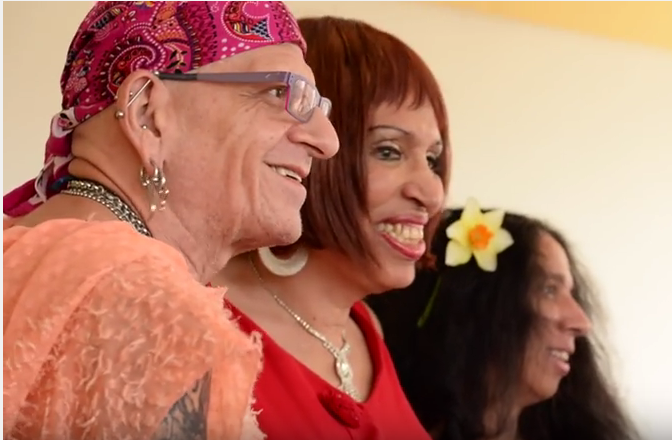 Renee: That’s right! We used to have some t-shirts years ago that we were outlaws. When I was younger, people were worried about what would other people think about them if they think about us in a positive way. A lot of that has disintegrated from 30 years ago. I’m talking about the people who say listen, I’m not homophobic or transphobic, I just don’t want to be seen with you because I don’t want my friends to think I’m like you, or want to be like you. You don’t have to be like me or want to be like me to communicate and share thoughts. These are some of the greatest obstacles in human development. That’s why I say that transition is perpetual. It’s not like there’s *this* goal. We don’t even know what’s beyond that’s horizon. But it’s coming. It’s inevitable. The only thing that hasn’t changed are the violent psychotics, who as many people know, are mostly closet cases. When they see us, we remind them of something they feel inside about themselves that they hate, and they’re going to punish us for it.
Renee: That’s right! We used to have some t-shirts years ago that we were outlaws. When I was younger, people were worried about what would other people think about them if they think about us in a positive way. A lot of that has disintegrated from 30 years ago. I’m talking about the people who say listen, I’m not homophobic or transphobic, I just don’t want to be seen with you because I don’t want my friends to think I’m like you, or want to be like you. You don’t have to be like me or want to be like me to communicate and share thoughts. These are some of the greatest obstacles in human development. That’s why I say that transition is perpetual. It’s not like there’s *this* goal. We don’t even know what’s beyond that’s horizon. But it’s coming. It’s inevitable. The only thing that hasn’t changed are the violent psychotics, who as many people know, are mostly closet cases. When they see us, we remind them of something they feel inside about themselves that they hate, and they’re going to punish us for it.
Kai: Or try to.
Renee: Every year we have a litany of names of slaughtered trans people, just for being their true selves. You know what? As Malcolm X said, “by any means necessary.” We will defend ourselves. Thirty years ago, if you had 100 pennies in a sock in your purse, the cops couldn’t arrest you for it. And you know what? It worked. Mostly just as an intimidating factor.
Kai: Then they leave you alone.
L: When we’re talking about capitalism and social oppression, what directly impacts our work is financial support and lack thereof. Statistically our community does not have the same access to jobs, education, and housing, especially queer and trans people of color. We also see trans artists not having financial support. For a program of queer and trans artists it’s hard to get the support we need, especially since we’re not formalized with a 501c3 status. We rely on support from community members and friends to cover basic needs, like making sure people have the means to get here, and that we have food for people so that they can come here during the time they would usually eat. A lot comes out of the facilitators’ own pockets. We’ve been grateful for the support we’ve received, but in today’s climate of giving or lack thereof, it is that much harder to do get that really basic support that we need.
C: Thanks for reminding us L that we need fucking money!
Are you all familiar with Peacock Rebellion? They’re a QTPOC, transfemme-centered org that also does performance work who I interviewed for WWW. In our conversation, they were talking about the balance of doing “tapdancing” for funders in order to get financial support to make their work sustainable. [Devi] was saying how those kinds of funders want you to talk about your trauma and other things that fit the tragedy narrative of trans women. It seems like you all are much more focused on the empowering, the zap, the lightening of what you have, like Peacock Rebellion.
Christian: The only grants we applied to was the Trans Justice Fund. We just haven’t been interested in engaging with the foundational industrial complex and shit like that. I don’t think we ever will.
Who are some people who serve as guidance and inspiration for this work?
Renee: Trancestors of this community gave everything to us. They sacrificed everything to help develop emerging realness that people never knew they had. I think back to my milieu which basically is Paris is Burning. Not those fuckin’ intellectuals in their ivory tower with the fuckin’ asterisk next to trans who sit there and anoint themselves as the determiners of who is cis and who is trans. They oughta be ashamed of themselves. Where would those people be now without us street fighters? Sylvia, Miss Major, and many others of us were in the street in different capacities, as street fighters, street workers, and sex workers.
You constantly had a perimeter around you. How many people know that when we walk down the street we often deliberately walk against the flow of traffic, ‘cause nobody can chase you down if you’re walking against traffic, right? Little things like that. Scout out every street from midtown to Chelsea to the village, every alley way, every inlet, every possible escape route. We don’t do that like that was modus operandi every day. We were soldiers. Now, I’m almost shocked by the acceptance I get. I try to tell people, Marsha P. Johnson died for you. She did. I try to make them understand what I mean by that obsessively. I am obsessed with it. I think about it every day.
Let me also say this. Trancestors, we owe our young people. A lot of them say, you’re an inspiration. I say, you don’t think you’re inspiring us to charge our batteries? This emerging realness has been the greatest therapy I could ever get. I can say this for other older trans women as well, it has even caused many older people to re-blossom. We may not have done that without Kai.
Kai: I don’t know why, I don’t know how, but I guess I did that! I’m inspired by Janet Mock and other people who grew up in the streets and frontlines and got to a place where they could reach such a wider audience, and who give back to people who don’t have that exposure, and educate others on trans experience. Also, as a younger person, I really look up to Renee. I learn from her every time I’m around her. It’s people like her who actively want people to know what our community has been through and where we are going and where we are now and where we have been. It’s great.
L: For me, the most influential trans folk who I’ve known have been the young people I’ve worked with. In doing development work with young people, one of them brought in a grid of different non-binary identities and I was like wow, there are all these other identities? I did some research and found one at the time that fit me. I was like oh my god, other people also feel this way. At the time it was demi-gender — people feeling like they have cis parts of themselves but also fluid or genderqueer parts to themselves. It was a tra-la-la for me. It was like a switch that was flipped. If I hadn’t been working with those young people I don’t know if that ever would have happened. LGBTQ youth have always challenged how I see the world and how I see myself, especially around the various points of identities. I’ll always be thankful for that.
Do you want to share any other thoughts or feelings coming up in this conversation?
Christian: When I was in my masters program, one of the moments that clicked for me about this work was its capacity to envision the world that we want through theater. It has that capacity in a way that very few other mediums do. Afro-futurism and other queer futurism are really inspiring to me, and the foundations of a trans-futurism are in this work. Our first year, we did were the past, present, and future of the trans experience in three scenes. Young people are naturally amazing at imagination, but anyone is capable of playing and and exploring. That’s a part that I love that feeds me and challenges me to think more creatively and expansively about my own gender.
This is the first year I’ll be doing this project on hormones. I credit participating in the project and meeting more trans people for giving me more tools to think creatively about my gender, my body, and outside of the boring and limiting narratives the media gives trans people.
Renee: The Transgenerational Theatre Project did not save my life. But it saved the rest of my life.
The TransGenerational Theatre Project is a group of multigenerational trans and gender nonconforming people co-creating original theatre from our own ideas and experiences. Through our highly collaborative process we foster connections, TGNC community and joy. We stand for equity, social justice, and the dismantling of transphobia, transmisogyny, ageism, racism, and and all linked forms of systemic oppression. We center the voices and experiences of transgender and gender nonconforming elders, particularly people of color. Please support TGTP by contributing to their GoFundMe fundraiser!
Christian is a radical non-binary trans femme arts activist and performer. They co-founded The TransGenerational Theatre Project, a multigenerational devised theatre project for trans and gender non-conforming people, and they are proud to be facilitating the project for a third year in preparation for a performance in the Trans Theatre Festival. They are a graduate of the CUNY Masters in Applied Theatre program and work as the Women’s Program and Arts & Culture Program Coordinator at the Edie Windsor SAGE Center. They also create solo performance that explores trans rage, grief, ritual, and futures.
This interview is part of a series for The World We Want to Live in.


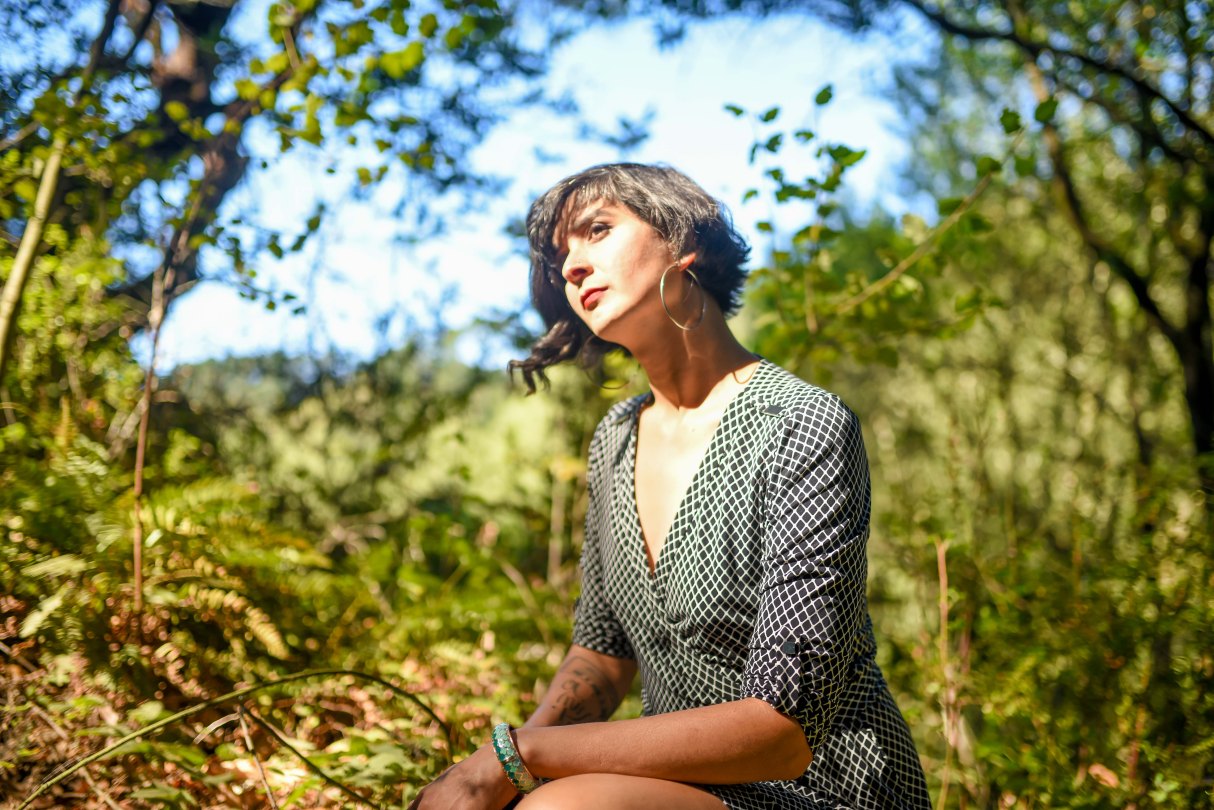





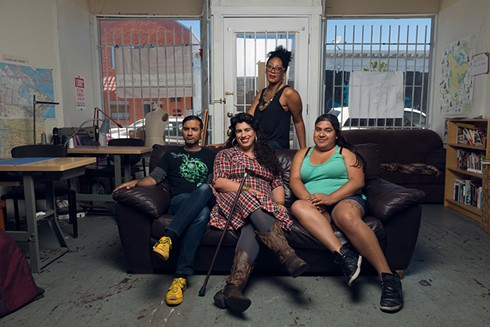

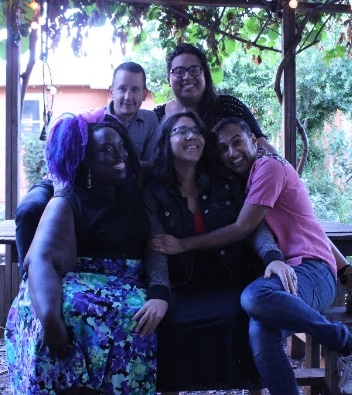
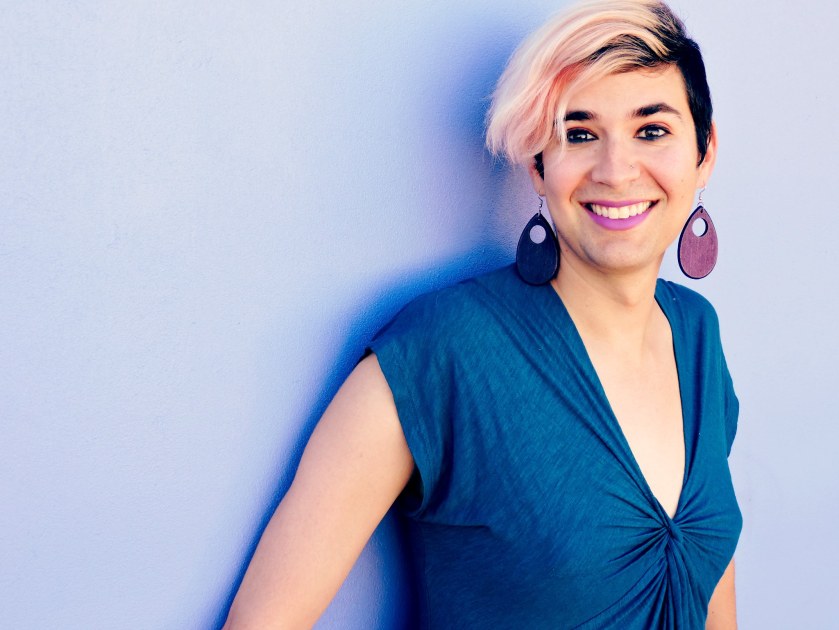


 What about on a personal level? You mentioned being in a space of some fear and anxiety. How does that play into what you are or aren’t able to take on in a given moment?
What about on a personal level? You mentioned being in a space of some fear and anxiety. How does that play into what you are or aren’t able to take on in a given moment?